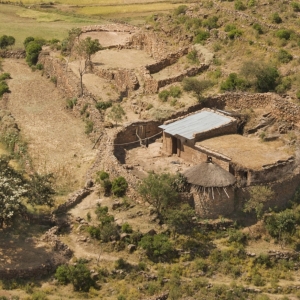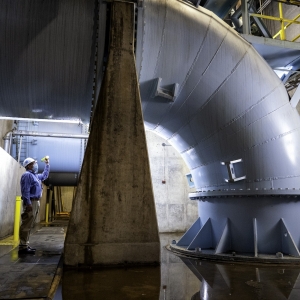Federal Water Tap, February 1: House Democrats Renew Push for Water-Bill Aid
The Rundown
House Democrats propose $1.5 billion to help low-income households with water and sewer bills. A congressional task force outlines its PFAS priorities for the Biden administration. The president’s executive order on climate change establishes an interagency council on environmental justice. U.S. Geological Survey researchers look at the relationship between rainfall and streams in a New Mexico watershed before and after a fire. And lastly, the Senate confirmation hearing for Michael Regan, the nominee to head the EPA will be on February 3.
“You know, we can put millions of Americans to work modernizing our water systems, transportation, our energy infrastructure to withstand the impacts of extreme climate. We’ve already reached a point where we’re going to have to live with what it is now. That’s going to require a lot of work all by itself, without it getting any worse.” — President Joe Biden speaking at the White House before signing executive orders on climate change and science.
By the Numbers
30 percent: Share of the nation’s lands and waters that the Biden administration aims to protect by 2030. (White House)
News Briefs
Water Bill Assistance
House Democrats introduced legislation that would provide $1.5 billion to help low-income households pay water and sewer bills.
The proposal is similar to attempts last year to establish a federal assistance program. But there is one possible notable difference.
States and tribes that accept grants agree not to shut off water during the health emergency and to reconnect homes where water has been disconnected.
The secretary of the Department of Health and Human Service will determine state and tribal allocations based on low-income households, average water rates, and the impact of the pandemic. The proposal encourages use of LIHEAP, the federal energy assistance program, to distribute money.
The possible difference is with the assistance that Congress approved in December. The $638 million in that package is directed at paying off arrears. This proposal says it does not require utilities to forgive outstanding debt. The press secretary for Rep. Rashida Tlaib, a sponsor of the proposal, did not respond before deadline to a question about whether funds could be used for debt forgiveness or if they are just for lowering future bills.
In context: Millions of Americans Are in Water Debt
Clean Water Act Resolution
Twenty-five Senate Republicans introduced a resolution that contains two statements. One, clean water is a national priority. Two, that the Biden administration should not withdraw or vacate the Navigable Water Protection Rule, which the previous administration put in place to narrow the scope of the Clean Water Act.
PFAS Recommendations
The bipartisan Congressional PFAS Task Force outlined actions it hopes the Biden administration will take in response to PFAS contamination of water, land, air, and human bodies.
Signed by 132 members of Congress, the task force’s letter mentions actions such as:
- Finalize national drinking water standards for PFOA and PFOS
- Designate PFOA and PFOS as hazardous substances under federal statute
- Phase out “non-essential” uses of PFAS in household products
- Order the Defense Department to accelerate PFAS clean up at military bases.
Studies and Reports
Post-Fire Streamflow
U.S. Geological Survey researchers used streamflow data from before and after a fire in New Mexico to model the effect of fire on the watershed.
They found that the relationship between rainfall and streams “changed dramatically” after fire. Burned areas shed much more water. That’s because of less tree canopy to intercept rain, less soil moisture, and more water-repellent soils. There are implications for flooding, they write.
County-Level Nutrient Inputs
The U.S. Geological Survey published a data set with county-level inputs of nitrogen and phosphorus, from 1950 to 2017. The data accounts for two nutrient sources: commercial fertilizers and manure.
On the Radar
EPA Administrator Hearing
On February 3, the Senate Committee on Environment and Public Works will hold a confirmation hearing for Michael Regan, the nominee to head the EPA. The hearing will be livestreamed beginning at 2 p.m. Eastern.
Regan is the secretary of the North Carolina Department of Environmental Quality.
USDA Secretary Hearing
On February 2, the Senate Agriculture Committee will hold a confirmation hearing for Tom Vilsack, the nominee to head the U.S. Department of Agriculture. The hearing will be livestreamed at 10:30 a.m. Eastern.
Vilsack headed the department during the Obama administration.
Environmental Justice Council
President Biden’s executive order on climate change established a White House Environmental Justice Interagency Council.
Consisting of representatives of cabinet-level agencies, the council will seek ways to correct legacies of pollution in low-income and communities of color. The council is tasked with how to measure agency performance with respect to this goal.
Federal Water Tap is a weekly digest spotting trends in U.S. government water policy. To get more water news, follow Circle of Blue on Twitter and sign up for our newsletter.
Brett writes about agriculture, energy, infrastructure, and the politics and economics of water in the United States. He also writes the Federal Water Tap, Circle of Blue’s weekly digest of U.S. government water news. He is the winner of two Society of Environmental Journalists reporting awards, one of the top honors in American environmental journalism: first place for explanatory reporting for a series on septic system pollution in the United States(2016) and third place for beat reporting in a small market (2014). He received the Sierra Club’s Distinguished Service Award in 2018. Brett lives in Seattle, where he hikes the mountains and bakes pies. Contact Brett Walton






Leave a Reply
Want to join the discussion?Feel free to contribute!